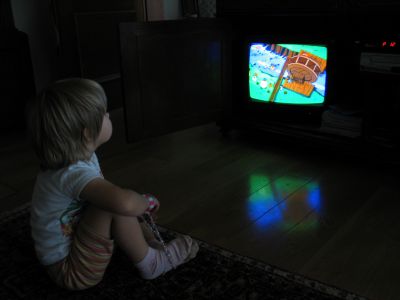Television is not all bad. Sometimes it could be an excellent resource for education as well as entertainment. For instance, there are a lot of fun educational DVDs and TV programmes for children that could help develop their language development. Including, learning the alphabet, singing rhymes, music and movement and more. While school age kids can also learn about geography and culture, nature, wild-life, technology and heaps more. However, too much Television starts to become a habit and could get in the way of other important activities like physical activities, reading and writing, doing homework and spending time with family and friends.
Television Impact On Children
Today many experts recommend against TV for children and some experts recommend no TV at all for children under the age of 2. A lot of researches have been done and a lot more are carried on even today to understand the effects of TV on children.
Researchers have shown that watching too much TV shows and programmes can cause all sorts of behavioural, physical and psychological problems in children like violent behaviour and increased aggressive behaviour, increased fear, sleep problems, attention deficit disorder, poor performance in school, obesity, promoting behaviours like smoking, drinking, drug use, premarital sex and a lot more. The list is almost never ending. However, I believe that there is no point blaming TV for everything. Most children would not end up with the problems the researches have shown above if the parents are strict and impose discipline with the children from the early age itself.
Setting Good TV Habits
It is very important that you teach your child good TV habits from an early age itself in order to implement discipline and routine. The following points will give you some practical ways of implementing good TV habits:
- Monitor your child while watching TV and ensure that the content of the TV programme is age appropriate.
- Avoid your child from viewing shows with violence, vulgarity, drug culture, sexual contents, scary contents and other age inappropriate programmes and shows.
- Understand the TV rating systems and codes and also read through the TV parental guidelines available in your country.
- Set viewing limits to make sure that your child doesn't spend too much time watching TV.
- Do not always encourage your child to watch TV so you can get some time or a break from them. Instead try to encourage your child to do other activities like reading, writing and playing.
- You have to be stern and say “No” when your child throws tantrums or being stubborn about watching TV when they are not allowed to. Instead suggest a fun alternative like playing board games, hide and seek, etc. If you give in and let them watch TV every time they throw a tantrum, you are actually spoiling your child. They will start to think that throwing a tantrum is actually a good thing for them since you will end up letting them watch TV. Your child is smarter than you think.
- Educate your child about TV while they are viewing. You can educate them on topics related to the programmes or shows. For example, if they are watching a wild-life show, you can educate them more about the animals, their behaviour, what they eat and more.
- Kids generally tend to believe the advertisements and other marketing messages. A lot of commercials target children in order to sell their product and most kids do not understand that ads are for selling a product. Explain to your child that the commercials are designed to make people buy things that they might not necessarily need. Put the things into perspective for your child to help them to understand. You can also tell them how ads make people think that the product can make them happier and what actually happens in reality.
- Teach your child that Television is for occasional entertainment only and that it is not the main and only form of entertainment.
- You can in fact use Television as an occasional incentive (or) a privilege to be earned after your child has completed their homework or after completing their chores. This will encourage a pattern of good behaviour. Use this technique only as a last option.
Teaching Discipline For Watching TV
Discipline is a very important factor and the next thing is setting an example. It is your responsibility, as a parent, who has to guide and help your child’s development along the way. Just remember, you as a Parent play the most important role in your child’s life. So, if you follow the guidelines below, you can ensure the safety of your child from various problems and also tone down the dangers of Television. Just remember – Discipline is the trick.
- Set a time limit for your child to watch TV and limit the number of TV viewing hours. It could be trouble if hours and hours are spent in front of the Television. Make sure you are always aware about how much time time your child spends watching Television.
- Put the TV in a common room like the family room or living room. Try to avoid placing a TV in your child’s bedroom or a closed room, when your child is at a young age.
- Teach your child to ask your permission first before switching on the TV and watching TV.
- Switch off the TV during meals.
- Set a good example for your child by limiting your own TV viewing.
- Do not allow your child to watch TV while doing their homework.
- Offer educational and fun alternatives to television like playing outside, reading, art n crafts, playing board games and much more. The options are limitless. .
- Try to watch TV together and you can even have it as family time. Talk to your child about what they see on TV and share their thoughts and ideas.
- If possible, allow your child to watch Television only during the weekends and possibly not during the weekdays. This practice will certainly help during school age when your child has more time for homework and after school activities. Play is the most important part of a child’s development.
- Do not allow your child to watch TV at night or after a specific scheduled time. Children have to understand that nights are for sleeping only.
Today almost every child around the world watches TV and not all of them turn out to have problems. The time it becomes a problem is when your child are allowed to overdo it, watch hours and hours of Television every day. The problem is not just with too much Television, it is the same problem when children are allowed to overuse many modern technologies today like the Internet, computer games & even mobile phones. So, don’t worry too much...follow the above guidelines and enjoy your time you spend with your kids. It is all part of them growing up!










